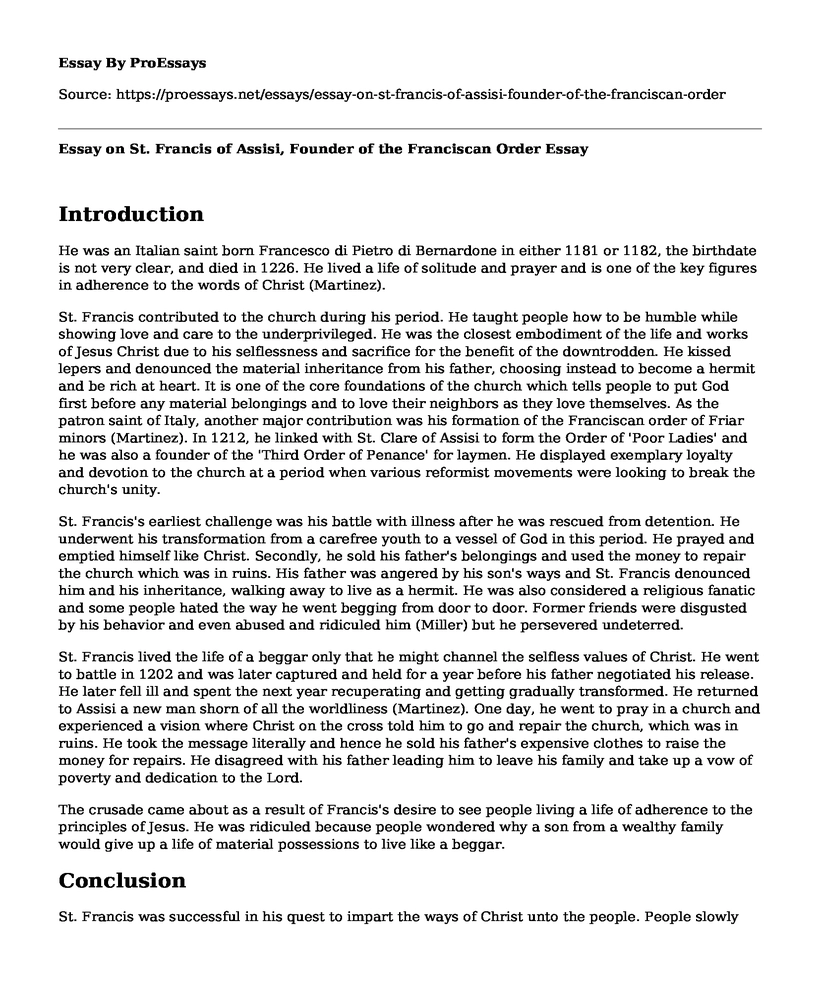Introduction
He was an Italian saint born Francesco di Pietro di Bernardone in either 1181 or 1182, the birthdate is not very clear, and died in 1226. He lived a life of solitude and prayer and is one of the key figures in adherence to the words of Christ (Martinez).
St. Francis contributed to the church during his period. He taught people how to be humble while showing love and care to the underprivileged. He was the closest embodiment of the life and works of Jesus Christ due to his selflessness and sacrifice for the benefit of the downtrodden. He kissed lepers and denounced the material inheritance from his father, choosing instead to become a hermit and be rich at heart. It is one of the core foundations of the church which tells people to put God first before any material belongings and to love their neighbors as they love themselves. As the patron saint of Italy, another major contribution was his formation of the Franciscan order of Friar minors (Martinez). In 1212, he linked with St. Clare of Assisi to form the Order of 'Poor Ladies' and he was also a founder of the 'Third Order of Penance' for laymen. He displayed exemplary loyalty and devotion to the church at a period when various reformist movements were looking to break the church's unity.
St. Francis's earliest challenge was his battle with illness after he was rescued from detention. He underwent his transformation from a carefree youth to a vessel of God in this period. He prayed and emptied himself like Christ. Secondly, he sold his father's belongings and used the money to repair the church which was in ruins. His father was angered by his son's ways and St. Francis denounced him and his inheritance, walking away to live as a hermit. He was also considered a religious fanatic and some people hated the way he went begging from door to door. Former friends were disgusted by his behavior and even abused and ridiculed him (Miller) but he persevered undeterred.
St. Francis lived the life of a beggar only that he might channel the selfless values of Christ. He went to battle in 1202 and was later captured and held for a year before his father negotiated his release. He later fell ill and spent the next year recuperating and getting gradually transformed. He returned to Assisi a new man shorn of all the worldliness (Martinez). One day, he went to pray in a church and experienced a vision where Christ on the cross told him to go and repair the church, which was in ruins. He took the message literally and hence he sold his father's expensive clothes to raise the money for repairs. He disagreed with his father leading him to leave his family and take up a vow of poverty and dedication to the Lord.
The crusade came about as a result of Francis's desire to see people living a life of adherence to the principles of Jesus. He was ridiculed because people wondered why a son from a wealthy family would give up a life of material possessions to live like a beggar.
Conclusion
St. Francis was successful in his quest to impart the ways of Christ unto the people. People slowly began to realize that he was really teaching the true ways of Christ (Martinez). Francis preached to the people despite the fact that he was a layman without a license. However, he managed to attract followers to his faith where he told them to follow the teachings of Christ and walk in his steps. He gathered twelve disciples and went to Rome seeking the pope to approve the Franciscan order. Soon, his friars were going to England, Germany, Spain, France, Turkey, and Hungary preaching the gospel of simplicity, repentance, and obedience to Christ.
Works Sited
Martinez, Michael. St. Francis Of Assisi: 'A Great, Great Figure in The Church'. CNN, 17 December. 2014, edition.cnn.com/2013/03/13/world/st--francis-of-assisi-profile/index.html. Accessed 23 Apr 2018.
Miller, Don. Saint Francis Of Assisi. Franciscan Media, 2018, www.franciscanmedia.org/saint-francis-of-assisi/. Accessed 23 Apr 2018.
Cite this page
Essay on St. Francis of Assisi, Founder of the Franciscan Order. (2022, May 21). Retrieved from https://proessays.net/essays/essay-on-st-francis-of-assisi-founder-of-the-franciscan-order
If you are the original author of this essay and no longer wish to have it published on the ProEssays website, please click below to request its removal:
- Discussion Paper Example on Christian Spiritual Vision
- Religion, Spirituality, and Healthcare: Essay Sample
- Progressive vs. Conservative: 1920s Battle for Modern American Culture - Essay Sample
- Mid-20th Century US: Changes in Culture, Economy, Population - Essay Sample
- European Colonization of Africa: Political, Social, Economic Effects - Research Paper
- Essay Example on Fredrick Douglass: Slave to Icon of Black American History
- Essay Example on The Endless Cycle of Creation: Buddhism vs. the Biblical Worldview







